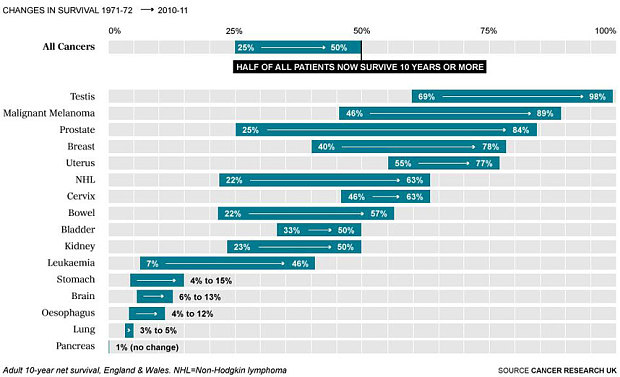‘Cure for terminal cancer’ found in game-changing drugs
Immunotherapy, which harnesses the body’s own immune system to destroy deadly tumours, has been hailed as one of the biggest breakthroughs in the treatment of cancer for decades
Terminally ill cancer patients have been “effectively cured” by a game-changing new class of drugs.
In one trial, more than half of patients who had just months to live saw deadly tumours shrink or completely disappear.
In recent days, the results of trials of a number of treatments which harness the body’s immune system have been announced at the American Society of Clinical Oncology’s annual conference in Chicago. They show promise in the fight against skin cancer and lung disease.
But results from a slew of trials released last night at the conference showed “spectacular” effects against a multitude of cancers.
Experts said the advances suggest terminally ill patients with common cancers – including lung, bowel, ovarian and womb – could in future be cured by the therapies.
The evidence in favour of the radical drugs is so overwhelming that they could save tens of thousands of lives in the UK within a decade, it is claimed.

• ‘I had months to live – now my tumours have disappeared’
• Beware the hype over ‘miracle’ cancer drugs
Senior cancer doctors said the treatment, known as immunotherapy, could radically change the standard treatment for cancer, sparing some sufferers from some of the toxic effects of chemotherapy.
Roy Herbst , chief of medical oncology at Yale Cancer Centre, described the string of results as “spectacular”.
“I think it’s huge,” he said. “I think we are seeing a paradigm shift in the way oncology is being treated.”
“I’m seeing this work in almost every cancer,” added Prof Herbst, who said the results suggested the therapy worked best on the cancers that were hardest to treat.
“The potential for long-term survival, effective cure, is definitely there,” he said.
Peter Johnson, Professor of Medical Oncology, from Cancer Research UK, said the therapies – which work by “re-educating” the immune system – are one of the greatest breakthroughs in cancer treatment in four decades.
“The evidence emerging from clinical trials suggests that we are at the beginning of a whole new era for cancer treatments,” he said.
“Some of the most common types of cancer seem to be treatable with immunotherapy. Overall, cancers of the lung, kidney, bladder, head and neck, and melanoma cause about 50,000 deaths a year, or around one third of cancer deaths.”
In one British-led study, 58 per cent of patients with advanced skin cancer saw their tumours reduce significantly when given a new combination of immunotherapy drugs.
In more than one in 10 cases, those given the drugs, called nivolumab and ipilimumab , the growths were entirely destroyed.
Such patients could expect to live just nine months if given standard treatment. The two-year study of 950 patients has yet to publish survival data but researchers said they were hopeful that half of the patients would end up “living disease-free”.
Lead author Dr James Larkin, consultant medical oncologist at the Royal Marsden Hospital, said he was excited about the prospects of the new treatments.
“We’ve seen these drugs working in a wide range of cancers and I think we are at the beginning of a new era of treating cancer,” he said.
Iplimumab, the only immunotherapy in use by the NHS, costs around £100,000 for four treatments.
The second drug, nivolumab, is expected to be licensed for use in Europe this summer.
The study found their results, when combined, were three times as good as when iplimumab was given alone. Trials involving a treatment for the most common type of lung cancer doubled the chances of survival for some patients.
Meanwhile trials examining the use of the drugs in womb, liver, head and neck, and bowel cancer showed “remarkable” results, specialists said.
• Parents can be ‘too nice’ to their children, neurologist warns
• Senior NHS doctor tells women ‘have baby before 30’
• Radioactive ‘bullets’ offer a shot at beating bowel cancer
Experts said the new treatments, which use the body’s immune system to stall the spread of disease, could soon become the mainstream treatment for a wide range of cancers.
“Cancers develop because they manage to hide from the immune system and disguise the danger they pose. Immunotherapy works by making the cancer visible again and alerting the body’s immune system to the danger,” Prof Johnston said. Patients who began some of the earliest trials 10 years ago appeared to have been cured, he added.
Last week, scientists announced that a genetically modifed herpes virus could spark the immune system into action, in another breakthrough in skin-cancer treatment.
‘Cure for terminal cancer’ found in game-changing drugs – Telegraph.



